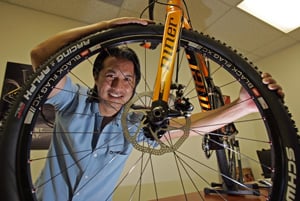
Carla Hukee works for the company Niner Bikes, which is in Torrance. But most afternoons, she heads for the hills to ride on her mountain bike – on trails near Salt Lake City. She returns an hour or two later to catch up on e-mails and return phone calls. That’s possible because Niner runs a virtual office.
Founder Chris Sugai lives in Torrance, but about a dozen designers and engineers work in Fort Collins, Colo. Hukee and her husband, Jordan, handle Niner’s marketing and branding work from Utah, and the company’s quality control manager is in Taipei, Taiwan, overseeing product manufacturing. They all stay in touch through e-mail, instant messaging and online video conference calls.
The company has 24 employees. Many of them had never met face to face until October, when Niner organized a four-day bike ride through the arches and canyons of Moab, Utah.
“Everybody already knew each other virtually so it was really easy to make friends,” Carla Hukee said. “The people who are attracted to Niner Bikes as employees tend to be people who are really comfortable making friends online.”
There are no set office hours and employees are not required to come in on a regular basis when it might be easier to work from home. Sugai said he thinks his employees are more productive than they would be if they were forced to make long commutes every day and stay cooped up in an office.
“I think it gives people a level of freedom and autonomy and a feeling of trust that you don’t get when you’re forced to come into an office every day,” he said.
Before Sugai started Niner Bikes, he owned a North Hollywood window-tinting company called Solar Art, which he has sold. Sugai said he wanted to get into something he was passionate about. He looked into poker, Formula 1 racing and mountain bikes – all things he enjoys – and ultimately ended up on bikes.
The first mountain bikes were adapted in the 1970s from heavy pre-World War II-era single-speed Schwinns. The wheel diameter then measured 26 inches. But about 10 years ago, avid mountain bikers began to rethink the wheel.
“The thought was that a larger wheel should make it easier to roll over logs and rocks and so forth, which is primarily what mountain bikers do,” Sugai said.
Niner Bikes designs high-end frames for mountain bikes with 29-inch wheels, hence the company’s name. Bicycle Retailer and Industry News this summer reported that the big wheels have grown from just 9 percent of the overall market share in 2009 to 22 percent in 2010.
The company, founded in 2005, has averaged 120 percent annual growth. Sugai said 2011 was the company’s first year of “solid profitability,” with revenue of almost $10 million. The company ranked No. 63 on Forbes’ list of most promising companies in December and No. 13 on the Business Journal’s November list of L.A.’s Fastest Growing Private Companies.
Sugai and his team design and engineer the bike frames then contract the designs to manufacturers in Taiwan. Components come from different bicycle parts companies, but Niner Bikes has lately begun expanding into designing its own parts, such as handlebars, seat posts and even parts of the drive train.
Lower overhead
Why the virtual office? What are the advantages and the drawbacks?
“There’s not a huge talent pool based in Los Angeles, especially in the cycling industry,” Sugai said. Not to mention the company saves money by not moving people to Los Angeles, where the cost of living is significantly higher than places in Utah and Colorado.
Darleen Derosa, managing partner for New-York based OnPoint Consulting LLC and an organizational psychologist, said there are major benefits to virtual collaboration versus its physical counterpart. For one, it saves businesses a lot of money.
“It’s cost-effective and a lot more efficient for organizations to have people working in different geographies, because they have a lot less overhead,” Derosa said.
Niner Bikes maintains its virtual office mostly by means of cloud computing, or using software from a remote server or cloud that can be accessed by employees at any place and any time with an Internet connection. They use NetSuite Inc., a pay-as-you-go cloud-computing service in San Mateo created for businesses.
But for all the benefits of working virtually, Derosa said there are just as many potential drawbacks. Effective communication, for instance, is more important than ever when a business moves online. It’s not uncommon for employees in a virtual workplace to lack clear goals, be unsure of their specific role within the company and feel isolated. Furthermore, it’s harder to hold people accountable for getting their work done.
“The best virtual employees are folks that are very good at communication, are very strong collaborators and take initiative,” she said. “If they’re proactive and they’re taking initiative, that usually results in fewer problems with accountability.”
Sugai acknowledged that the synergy of having a team working together in the real world is a real thing.
“The water-cooler effect is something you can’t take lightly,” he said. “That’s one of the drawbacks of working virtually, you do lose out on that. But at the same time, you have a more focused workplace.”
Sugai said Niner Bikes holds weekly meetings via Skype to keep employees on track and reinforce company goals. And employees get to take to the hills on their bikes – wherever they are – to get in touch with the passion that drives them.
“It makes for a much more rewarding work life and balance when you’re doing something that you love every day,” he said.
